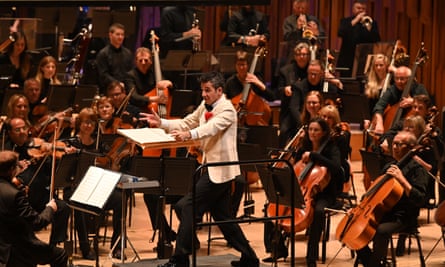It felt apt that the Barbican Centre’s Curve gallery’s current exhibition is AI: More Than Human: this was a festival I wished I could have cloned myself and experienced the weekend a second and a third time so as to take different paths across the lineup - 150-odd live events, all free, spread across 19 venues within the Culture Mile.
With no concert longer than an hour, each programme introduced by its performers, and audiences free to come and go, the Barbican’s third Sound Unbound festival goes from strength to strength and gives the lie to those who think classical music is stuffy or unapproachable. While this might be the first time I’ve listened to a Beethoven symphony sitting next to a teenager checking her phone, or had the slow movement’s spell briefly interrupted by a wriggling toddler telling his father in ringing tones, “I need a wee”, or watched a young trio thread their way to seats right in the front row as the first movement built to a climax, the open-hearted spirit that is at the core of the festival meant that this all enhanced an inclusive and joyous listening experience.
It was also an opportunity to hear new voices on stage. Countertenor John Holiday is little known in the UK, but that surely is about to change. The US-born singer is a natural stage presence with a gloriously rich and pure sound. Sharply dressed from top to bottom (sparkly shoes with red soles), he’s a great storyteller whose set ranged from Hahn to Handel via Gershwin (a spine-tingling Summertime, for which he accompanied himself at the piano), spirituals and a number by Margaret Bonds and Langston Hughes.
“It’s important for artists, especially those who look like me, to have a voice,” he said. “Often I’m the only African American in the room, but I stand on my ancestors’ shoulders, and I’m never not where God didn’t intend me to be.”

Nora Fischer is another singer who brings freshness to 17th-century music. Her starting point was wondering how the likes of Purcell, Dowland and Monteverdi would sound were they writing three-minute pop songs today. She and collaborator Marnix Dorrestein (on electric guitar) strip the 17th-century ballads and arias back to their bones, and perform them with direct and powerful simplicity. Fischer has a voice of fragile purity and beauty, and does indeed make these 400-year-old songs sound box-fresh. Purcell’s Cold Song and Come All Ye Songsters are standouts in an enjoyable and accessible set.

Saturday’s evening concert was a screening of The Artist, the 2011 Oscar-winning homage to the silent movie era with the soundtrack played live by the BBC Symphony Orchestra. Composer Ludovic Bource himself was at the piano, and as the closing applause filled the hall, he took over Ernst van Tiel’s baton and got the BBCSO’s brass to their feet for an irresistible reprise of the movie’s jazzy dance theme. Everyone left the hall beaming. For those with more stamina than me, a club stage had been set up where DJs from Gabriel Prokofiev’s Nonclassical label promised genre-defying sounds into the night.
Elsewhere there was sackbuts, the Street Orchestra, Jess Gillam’s saxophone, Stalin’s piano, and experimental percussion music from Three Strange Angels, virtual reality and walking tours … and so much more. Sunday began with Stephen Fry introducing the Britten Sinfonia with Thomas Adès’s thoughtful and thrilling performance of Beethoven’s Third Symphony. “There’s no ‘right’ way to listen to this music, only to remember the greatness of this man born 250 years ago,” he said, before taking his seat in the stalls to listen with the rest of us.

Comments (…)
Sign in or create your Guardian account to join the discussion